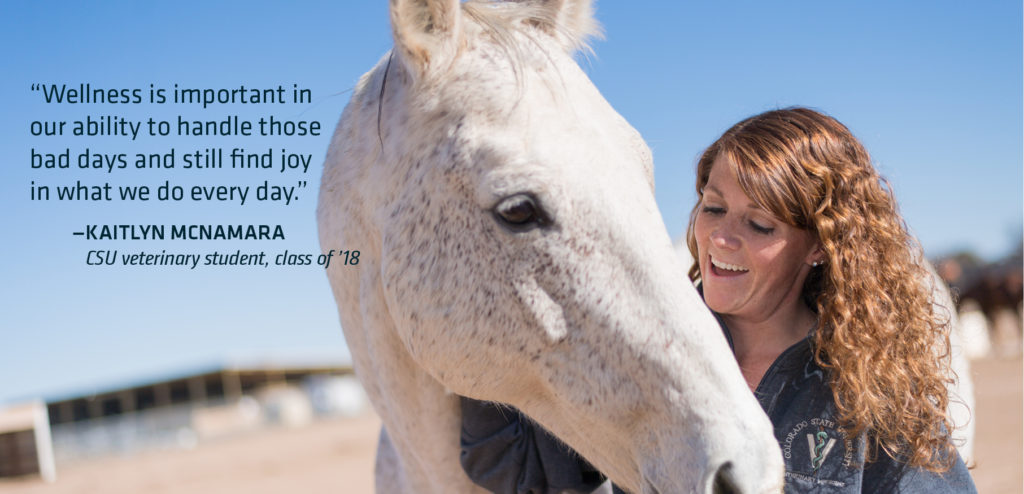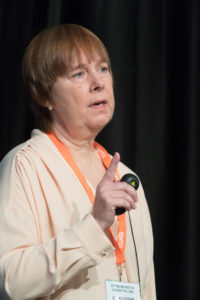
An international conference on veterinary wellness ran Nov. 4-6 at Colorado State University and focused on a challenging question: How can mental health and well-being be improved within the veterinary profession?
Dr. Michele Gaspar, a feline veterinarian and licensed professional counselor from Chicago, noted during an opening talk that veterinary medicine is physically, emotionally and intellectually demanding. The field requires that practitioners ably handle the medical needs of sick and dying animal patients, as well as the concerns of frequently distressed animal owners.
These aspects of veterinary work – combined with the traits of introversion and perfectionism shared by many people in the field – may contribute to depression, anxiety and even suicide among some veterinary professionals, Gaspar said.
“Our wellness has to be in developing our students and our profession to courageously be able to hold others’ pain,” she said.
CSU hosts veterinary health summit for first time

Gaspar’s keynote address on Nov. 4 opened the fourth annual AAVMC Veterinary Health and Wellness Summit, a program of the American Association of Veterinary Medical Colleges hosted by CSU’s College of Veterinary Medicine and Biomedical Sciences. The conference was the first to involve veterinary students and practitioners along with educators, social workers and counselors.
With the theme of “Reaching New Heights in Veterinary Well-Being,” the 2016 summit spanned three days and attracted 270 attendees for presentations and workshops meant to raise awareness about mental-health issues that beset some people in the industry, as well as concrete steps that may improve well-being among veterinary professionals.
Dr. Andrew Maccabe, AAVMC chief executive officer, noted during the opening session that veterinary medicine is tackling concerns about practitioner well-being that are shared in related fields, including nursing, dentistry and human medicine.
Maccabe called on veterinary colleagues to destigmatize mental health problems, to encourage resilience among students and practicing professionals, and to remember that help is available for those suffering with depression, anxiety and other mental-health concerns.
“This conference is aimed at raising awareness so that we can deal with this problem openly,” Maccabe said. “We need to turn to our professional colleagues in mental health to solve this issue.”
Gaspar encourages teaching students self-compassion
Gaspar suggested that veterinary schools consider ways to develop “antidotes to perfectionism,” teaching students the self-compassion that builds confidence, competence and resilience.
“We need to model service and courage, recognizing that we have the privilege to serve and have to do so courageously,” Gaspar said. “Courage doesn’t mean we’re not afraid. It means that we need to go forward with grace.”

Dr. Mark Stetter, dean of CSU’s College of Veterinary Medicine and Biomedical Sciences, demonstrated his own wellness pledge by riding into the crowded conference hall on his mountain bike, wearing cycling gear and a helmet. The entrance was meant to demonstrate that veterinarians must prioritize their own well-being to effectively care for animal patients and their human owners.
“This profession is facing a serious crisis, and we’re here to make a difference,” Stetter said in welcoming remarks. “When we’re healthier, we’re able to be more resilient, we’re able to deal with stress, and we’re able to demonstrate this in our personal and professional lives.”
As the conference closed, students, practitioners, social workers and industry leaders said they felt energized about the ideas and tools that were shared.
“There is a strong feeling that we have hit a tipping point and that this problem is becoming a top priority,” Stetter said. “We are poised to make a difference across the veterinary profession.”
The fourth annual AAVMC Veterinary Health and Wellness Summit was sponsored by Zoetis and VCA, with additional support from the American Association of Veterinary Medical Colleges, AVMA LIFE, AVMA PLIT, and Banfield Pet Hospital.